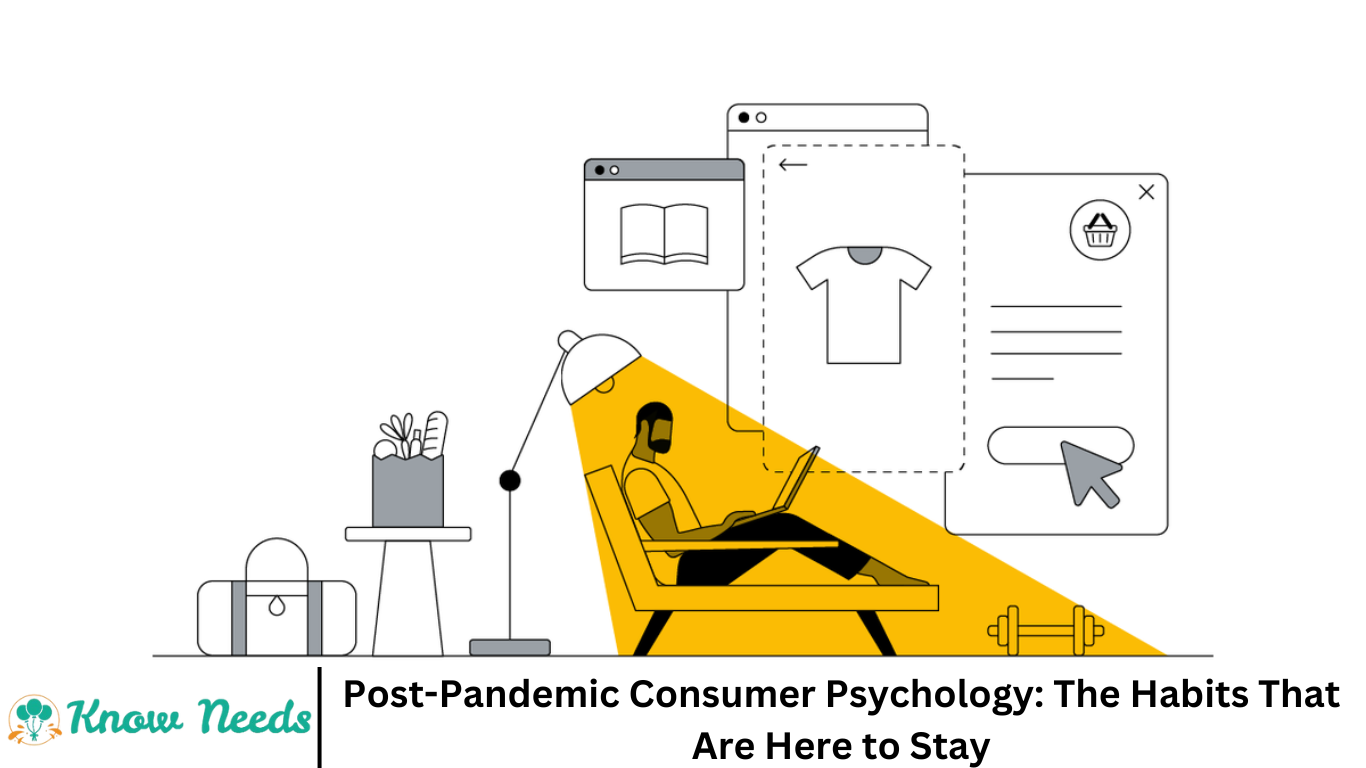The COVID-19 pandemic dramatically reshaped the global landscape, transforming economies, societies, and individual lifestyles. Among these shifts, consumer behavior underwent one of the most significant changes in recent memory.
As the world gradually moves beyond the peak of the pandemic, marketers and businesses face a critical question: which of these newly formed consumer habits will persist in the long term? Understanding post-pandemic consumer psychology is essential for brands aiming to thrive in this evolving market.
In this article, we’ll explore the psychological drivers behind consumer behavior changes triggered by the pandemic, identify the key habits that are here to stay, and discuss how businesses can leverage these insights to adapt their strategies effectively.
More Read: 5 Key Reasons Sustainability Is Shaping the Future of Business
The Pandemic as a Catalyst for Consumer Behavior Change
The COVID-19 pandemic acted as an unprecedented inflection point, forcing consumers worldwide to reassess their priorities and daily routines. Lockdowns, social distancing, economic uncertainties, and a surge in digital adoption led to rapid shifts in how people shop, consume media, and make decisions.
The Impact of COVID-19 on Consumer Behavior
- Acceleration of Digital Adoption: Consumers embraced e-commerce, streaming services, and online communication at rates never seen before.
- Focus on Health and Safety: Hygiene products, wellness services, and health-focused purchases surged.
- Shift Toward Local and Sustainable: Many consumers began prioritizing local businesses and sustainable products.
- Value-Driven Purchases: Economic uncertainty made price sensitivity and cost-effectiveness more prominent in purchase decisions.
- Experiences Over Goods: Lockdowns made people crave meaningful experiences, influencing future spending priorities.
While some behaviors were pandemic-specific, many have evolved into ingrained habits likely to influence consumption patterns well into the future.
Understanding Consumer Psychology: Why Habits Stick
To predict which habits will endure, it’s important to understand the psychology of habit formation. A habit forms when a behavior becomes automatic through repetition, typically driven by psychological rewards.
The Habit Loop
According to behavioral psychology, habits follow a loop of cue → routine → reward:
- Cue: A trigger that initiates the behavior.
- Routine: The behavior itself.
- Reward: The positive outcome reinforcing the habit.
For a new behavior to become a lasting habit, the reward must be compelling, and the routine must be easy to repeat.
Psychological Factors Behind Habit Formation Post-Pandemic
Research, including a recent Kadence International survey, highlights five main psychological factors that influence whether consumers will maintain new behaviors:
- Convenience: Easier processes encourage continued use.
- Time-Saving: Behaviors that save time have a higher chance of persistence.
- Cost-Effectiveness: Value for money is crucial, especially in uncertain times.
- Enjoyment: Positive emotions linked to the habit increase retention.
- Personal Reward: A sense of personal benefit or achievement helps cement behavior.
Consumers weigh these factors consciously or subconsciously when deciding to maintain a habit formed during the pandemic.
Key Post-Pandemic Consumer Habits That Are Here to Stay
Based on consumer psychology insights and market research, several pandemic-born habits have strong staying power:
1. E-Commerce and Online Shopping
The pandemic forced millions to shop online for essentials and non-essentials alike. Even as physical stores reopened, many consumers retained the convenience and safety of digital shopping.
- Why it sticks: E-commerce saves time, offers convenience, and often provides better deals.
- Psychological drivers: Convenience, time-saving, and cost-effectiveness.
- Business implication: Brands must invest in seamless online experiences, mobile optimization, and efficient delivery services.
2. Health and Wellness Focus
Increased health awareness is one of the most enduring changes. Consumers are prioritizing hygiene, mental health, nutrition, and fitness more than ever.
- Why it sticks: Personal reward in feeling healthier and safer.
- Psychological drivers: Personal reward and enjoyment (wellness activities).
- Business implication: Health-oriented products and services, including supplements, home fitness, and telehealth, will remain in demand.
3. Digital Entertainment and Streaming
With theaters closed and social events limited, consumers turned to digital entertainment platforms like Netflix, Spotify, and gaming services.
- Why it sticks: Enjoyment and convenience.
- Psychological drivers: Enjoyment, convenience.
- Business implication: Media companies should continue innovating with personalized content and interactive experiences.
4. Home-Centric Lifestyle and Remote Work
Remote work and home-based lifestyles reshaped how people invest in their homes and daily routines, from cooking to home office setups.
- Why it sticks: Time-saving, convenience, and personal reward.
- Psychological drivers: Convenience, time-saving, personal reward.
- Business implication: Businesses catering to home improvement, DIY, remote work technology, and home entertainment will thrive.
5. Sustainability and Ethical Consumption
Pandemic disruptions increased awareness of environmental and social issues. Many consumers now prefer brands that demonstrate sustainability and corporate responsibility.
- Why it sticks: Personal reward from supporting meaningful causes.
- Psychological drivers: Personal reward, enjoyment from aligning purchases with values.
- Business implication: Transparency, sustainability certifications, and ethical messaging are essential for brand loyalty.
Bridging the Gap Between Intention and Behavior
One challenge for marketers is the well-documented gap between what consumers say they will do and what they actually do. This gap is especially pronounced in new situations like a pandemic.
Why Consumers Misjudge Their Own Behavior
- Optimism bias: People often overestimate their ability to sustain positive habits.
- Novelty effect: Initial excitement can fade.
- External constraints: Changing circumstances impact behavior.
Hence, consumer surveys alone can be misleading. Combining qualitative insights with behavioral data and psychological frameworks leads to better predictions.
Using a Habit-Forming Index to Predict Future Consumer Behavior
To address this, research like Kadence International’s habit-forming index helps brands evaluate behaviors based on two dimensions:
- Consumer Intent: How likely people say they will continue a behavior.
- Habit Strength: Psychological likelihood the behavior will persist based on factors like convenience and reward.
This matrix allows brands to identify which new consumer habits to prioritize and invest in for the future.
How Brands Can Adapt to Post-Pandemic Consumer Habits
Understanding consumer psychology and habit formation isn’t just academic; it’s a competitive advantage. Here’s how brands can leverage these insights:
1. Prioritize Convenience and Time-Saving Innovations
Invest in technology and processes that simplify the consumer journey—from checkout to customer service. For example:
- Mobile apps with one-click purchasing.
- Efficient delivery and returns.
- Seamless omnichannel experiences.
2. Enhance Emotional and Personal Rewards
Create products and services that offer genuine enjoyment or personal benefits:
- Wellness programs tied to rewards.
- Loyalty programs emphasizing personal achievement.
- Engaging content that resonates emotionally.
3. Align with Consumer Values
Show commitment to sustainability, diversity, and ethics transparently. Consumers reward brands that share their values:
- Transparent sourcing.
- Eco-friendly packaging.
- Social responsibility initiatives.
4. Leverage Data to Track Behavior Changes
Use data analytics to track ongoing behavior, segment consumers, and personalize marketing efforts to nurture lasting habits.
5. Innovate Around Remote and Home-Based Lifestyles
Cater to consumers spending more time at home:
- Products for home offices.
- Digital entertainment bundles.
- DIY kits and home fitness solutions.
The Future of Consumer Behavior: What to Watch Next
While some habits are firmly established, consumer psychology will continue evolving in response to new technologies, societal changes, and economic factors.
Emerging Trends
- Hybrid Shopping Models: A mix of online and in-store experiences enhanced by augmented reality (AR).
- AI-Powered Personalization: Tailored recommendations and experiences at scale.
- Increased Focus on Mental Health: Products and services targeting mindfulness and emotional well-being.
- Circular Economy Models: Growth in resale, rental, and repair services aligned with sustainability.
Brands that stay attuned to these trends, while reinforcing core habits formed during the pandemic, will be well-positioned for long-term success.
Frequently Asked Question
What is post-pandemic consumer psychology?
Post-pandemic consumer psychology refers to the study of how consumer thoughts, feelings, and behaviors have permanently changed due to the COVID-19 pandemic. It focuses on understanding the psychological drivers—such as convenience, safety, and emotional reward—that influence the lasting shifts in how people shop, interact with brands, and make decisions.
Which consumer habits are most likely to stick after the pandemic?
Habits likely to persist include online shopping, increased focus on health and wellness, digital entertainment consumption, remote work preferences, and value-driven buying (e.g., sustainability, local support). These behaviors became routine during the pandemic and are reinforced by psychological factors like convenience and personal benefit.
Why did the pandemic cause long-term changes in consumer behavior?
The pandemic disrupted daily routines and forced consumers to adopt new ways of living—many of which proved more convenient, cost-effective, or emotionally rewarding. Prolonged exposure to these new habits helped embed them into everyday life, making them more likely to stick.
How can businesses adapt to post-pandemic consumer behavior?
Businesses can adapt by prioritizing convenience (e.g., faster delivery, simplified checkout), embracing digital channels, focusing on personalization, investing in sustainability, and aligning with consumer values. Understanding what customers find rewarding or useful is key to retaining loyalty.
What role does habit formation play in consumer behavior post-COVID?
Habit formation plays a central role. When behaviors like online shopping or home workouts are repeated and consistently deliver positive outcomes (time savings, cost-effectiveness, enjoyment), they become automatic. The more rewarding and easy a habit is, the more likely it will endure.
Are consumers still prioritizing health and wellness after the pandemic?
Yes, health and wellness remain top priorities. Consumers continue to invest in hygiene products, mental health tools, fitness apps, and nutritional items. The pandemic heightened awareness around personal well-being, making this a lasting area of focus for many.
How can brands identify which habits will last?
Brands can use a combination of consumer surveys, behavioral data, and psychological frameworks (like the habit loop or habit-forming index) to assess habit strength. Analyzing factors like ease of use, emotional satisfaction, and repeat engagement helps determine which behaviors are likely to persist.
Conclusion
The COVID-19 pandemic fundamentally shifted consumer psychology, creating new habits shaped by convenience, time-saving, cost-effectiveness, enjoyment, and personal reward. While some behaviors were temporary, many are deeply ingrained and here to stay. By understanding the psychological drivers behind these habits and leveraging data-driven insights like habit-forming indexes, businesses can better predict which consumer behaviors will persist—and tailor their strategies accordingly. In the post-pandemic world, brands that adapt thoughtfully and empathetically to these changing consumer habits will not only survive but thrive.


